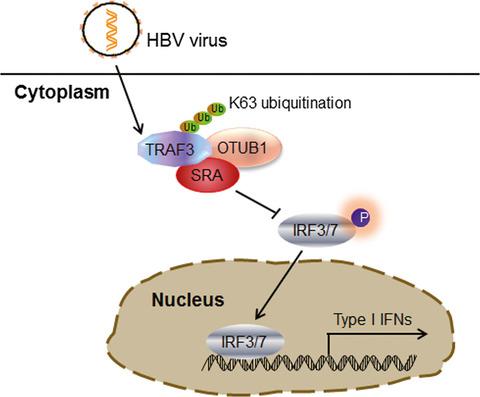Our official English website, www.x-mol.net, welcomes your
feedback! (Note: you will need to create a separate account there.)
Scavenger receptor A impairs interferon response to HBV infection by limiting TRAF3 ubiquitination through recruiting OTUB1.
The FEBS Journal ( IF 5.5 ) Pub Date : 2019-08-06 , DOI: 10.1111/febs.15035 Mengying Xie 1, 2 , Yue Yin 1, 2 , Liqian Chen 2 , Aiping Yin 2 , Yan Liu 1, 2 , Yunzhi Liu 2 , Lijun Dong 1, 2 , Qintao Lai 3 , Jia Zhou 2 , Liyun Zhang 2 , Min Xu 4 , Zhengliang Chen 2, 5 , Daming Zuo 1, 2, 5, 6
The FEBS Journal ( IF 5.5 ) Pub Date : 2019-08-06 , DOI: 10.1111/febs.15035 Mengying Xie 1, 2 , Yue Yin 1, 2 , Liqian Chen 2 , Aiping Yin 2 , Yan Liu 1, 2 , Yunzhi Liu 2 , Lijun Dong 1, 2 , Qintao Lai 3 , Jia Zhou 2 , Liyun Zhang 2 , Min Xu 4 , Zhengliang Chen 2, 5 , Daming Zuo 1, 2, 5, 6
Affiliation

|
The battle between hepatitis B virus (HBV) infection and the host immune defense determines the outcome of the disease. Scavenger receptor A (SRA) is a phagocytic pattern recognition receptor involved in various cellular processes, including lipid metabolism, recognition, and clearance of pathogens or modified self-molecules. Emerging evidence pointed out that SRA might act as an immunomodulator that contributes to innate immune defense against invading pathogens. Herein, we examined the role of SRA in the initiation of type I interferon (IFN) response to HBV infection and the virus clearance. Our results showed that SRA-deficient (SRA-/- ) mice were resistant to HBV infection developed by hydrodynamic injection of HBV replicon plasmid. We found lower levels of HBV DNA and viral protein expression in SRA-/- mice, which was associated with enhanced type I IFN production, compared with wild-type controls. Besides, we performed gain and loss of function experiments and determined that SRA inhibits innate antiviral immune responses to HBV. SRA could interact directly with tumor necrosis factor receptor-associated factor 3 (TRAF3) and inhibit its K63-linked ubiquitination. Moreover, we provided evidence that SRA negatively regulates the stability of TRAF3 protein by promoting the recruitment of OTUB1 to TRAF3. Our findings indicate that SRA plays a crucial role in innate immune signaling by targeting TRAF3 for degradation and balancing the innate antiviral immunity.
中文翻译:

清除剂受体A通过募集OTUB1限制TRAF3泛素化,从而削弱干扰素对HBV感染的反应。
乙型肝炎病毒(HBV)感染与宿主免疫防御之间的斗争决定了该病的结局。清道夫受体A(SRA)是一种吞噬模式识别受体,参与各种细胞过程,包括脂质代谢,识别和清除病原体或修饰的自分子。越来越多的证据指出,SRA可能是一种免疫调节剂,有助于对入侵的病原体进行先天免疫防御。在本文中,我们研究了SRA在引发I型干扰素(IFN)对HBV感染和病毒清除的反应中的作用。我们的结果表明,SRA缺陷(SRA-/-)小鼠对通过动态注射HBV复制子质粒产生的HBV感染具有抗性。我们发现SRA-/-小鼠的HBV DNA和病毒蛋白表达水平较低,与野生型对照相比,这与I型IFN产生增加有关。此外,我们进行了功能丧失的实验,并确定SRA抑制了对HBV的先天抗病毒免疫反应。SRA可以直接与肿瘤坏死因子受体相关因子3(TRAF3)相互作用,并抑制其K63连接的泛素化。此外,我们提供的证据表明SRA通过促进OTUB1向TRAF3的募集负调节TRAF3蛋白的稳定性。我们的发现表明,SRA通过靶向TRAF3降解并平衡先天抗病毒免疫力,在先天免疫信号传导中起着至关重要的作用。SRA可以直接与肿瘤坏死因子受体相关因子3(TRAF3)相互作用,并抑制其K63连接的泛素化。此外,我们提供的证据表明SRA通过促进OTUB1向TRAF3的募集负调节TRAF3蛋白的稳定性。我们的发现表明SRA通过靶向TRAF3降解并平衡先天抗病毒免疫力而在先天免疫信号传导中起着至关重要的作用。SRA可以直接与肿瘤坏死因子受体相关因子3(TRAF3)相互作用,并抑制其K63连接的泛素化。此外,我们提供的证据表明SRA通过促进OTUB1向TRAF3的募集负调节TRAF3蛋白的稳定性。我们的发现表明SRA通过靶向TRAF3降解并平衡先天抗病毒免疫力而在先天免疫信号传导中起着至关重要的作用。
更新日期:2020-01-21
中文翻译:

清除剂受体A通过募集OTUB1限制TRAF3泛素化,从而削弱干扰素对HBV感染的反应。
乙型肝炎病毒(HBV)感染与宿主免疫防御之间的斗争决定了该病的结局。清道夫受体A(SRA)是一种吞噬模式识别受体,参与各种细胞过程,包括脂质代谢,识别和清除病原体或修饰的自分子。越来越多的证据指出,SRA可能是一种免疫调节剂,有助于对入侵的病原体进行先天免疫防御。在本文中,我们研究了SRA在引发I型干扰素(IFN)对HBV感染和病毒清除的反应中的作用。我们的结果表明,SRA缺陷(SRA-/-)小鼠对通过动态注射HBV复制子质粒产生的HBV感染具有抗性。我们发现SRA-/-小鼠的HBV DNA和病毒蛋白表达水平较低,与野生型对照相比,这与I型IFN产生增加有关。此外,我们进行了功能丧失的实验,并确定SRA抑制了对HBV的先天抗病毒免疫反应。SRA可以直接与肿瘤坏死因子受体相关因子3(TRAF3)相互作用,并抑制其K63连接的泛素化。此外,我们提供的证据表明SRA通过促进OTUB1向TRAF3的募集负调节TRAF3蛋白的稳定性。我们的发现表明,SRA通过靶向TRAF3降解并平衡先天抗病毒免疫力,在先天免疫信号传导中起着至关重要的作用。SRA可以直接与肿瘤坏死因子受体相关因子3(TRAF3)相互作用,并抑制其K63连接的泛素化。此外,我们提供的证据表明SRA通过促进OTUB1向TRAF3的募集负调节TRAF3蛋白的稳定性。我们的发现表明SRA通过靶向TRAF3降解并平衡先天抗病毒免疫力而在先天免疫信号传导中起着至关重要的作用。SRA可以直接与肿瘤坏死因子受体相关因子3(TRAF3)相互作用,并抑制其K63连接的泛素化。此外,我们提供的证据表明SRA通过促进OTUB1向TRAF3的募集负调节TRAF3蛋白的稳定性。我们的发现表明SRA通过靶向TRAF3降解并平衡先天抗病毒免疫力而在先天免疫信号传导中起着至关重要的作用。











































 京公网安备 11010802027423号
京公网安备 11010802027423号